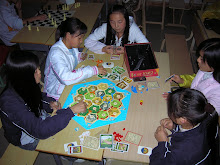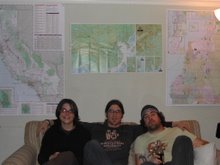
Drawing Blood

Waiting for the Doctor to Analyze the results
After taking my blood, the hospital personnel placed the vial in a large machine which printed out a paper for us to give the doctor. The doctor called the PC medical staff and explained that all of my blood results indicated no serious problem. We had the medical go-ahead to begin our trip to Vietnam. Interestingly, this entire process (leaving for the Hospital, registering, examination, paying for the blood exam, drawing blood, getting the results, the final examination of the results, and returning to the hostel took under one hour. We were impressed.
That night we boarded a bus bound for Hekou, a Chinese town on the border of Vietnam. Before getting on board a man took our bags and put them under the bus. "There is a 50 yuan fee ($7.50) for each bag because of gas," he said to us. We looked at one another skeptically and he pointed out that it was written on the back of our tickets and that all Chinese people must pay the bag fee too. We paid him 100 yuan and borded the bus. The bus was filled with 2 stories of very small beds in 3 rows. We squeezed our way through the aisle and found our beds before settling in and getting comfortable. The man who had taken our bags returned to ask other foreigners (a Japanese man and a Dutch woman) to pay the gas tax for their bags. They refused and he said he was going to take their tickets and refund their money so they could go the next day before he stormed to the front of the bus. I asked them about it and they said they didn't pay for their bags when the man put them in the compartment under the bus. Suspicious, I began to search the back of my ticket for a "gas fee" or "baggage fee." Although there were only Chinese characters on the back of the ticket, I found nothing regarding bags or extra fees. I challenged the man, explaining that others did not pay fees for their bags and that there was nothing on the ticket to suggest a need to do so. First he claimed that we paid an extra fee because our bags were so large, then showed me his clipboard and a hand-written "fee" of 50 yuan was on the top. Lies, I suddenly realized. Everything had been a show to get extra money from us, the unwitting foreign travelers. "You're cheating us!" I yelled in Chinese, alerting everyone on the bus that an argument was about to begin. A woman looked our over her sleeper-perch and asked to see my ticket. "It is the same price as mine," she said. I said that the man also charged me a luggage fee, which wasn't listed anywhere on the ticket. The man said, "You can go get the police if you don't believe me." But the last bluff belonged to me when I said, "I will, let me off this bus before we get going, I want to see the police immediately." As I spoke to the driver and a bus station employee at the front of the bus, the man quietly slipped off the bus. After several minutes I finally explained that the man had charged me a "luggage fee," and that nobody else had to pay it. The station employee asked me in Chinese, "Did you give him any money?" I didn't understand and she asked it louder and more frantically until another passenger translated very slowly, "she says... did you... give... money?"
"Yes!" I said, "We gave him 100 yuan." The woman, obviously angry, went after the man yelling at other employees in the crowded bus parking lot to try and stop him. Then she told me to wait at my sleeping perch because my money (which, this entire time had actually been Terrie's money) would be returned. A minute later it was returned and the matter was resolved. The bus crawled out of the station lot and we were on our way to Hekou. The ride was bumpy, but the sleepers were almost comfortable and we slept well. Early the next morning we awoke at the Hekou bus station and began the next phase of our journey: entering Vietnam. A fast talking Chinese man offered to help us get a train to Hanoi and the price seemed reasonable, so we bought tickets using Chinese Yuan. He said he would meet us on the other side of the border crossing (after we passed through Chinese and Vietnam customs) and offered his phone as proof of his sincerity (which I gladly tucked into my pocket).

China-Vietnam Border Crossing (Hekou to Lao Cai)
After passing customs (where they seemed especially concerned about books) we met the ticket salesman who provided our tickets and directed us toward the taxi area so that we could catch our soon-to-leave train at the nearby station. Three of us climbed into the van after the man explained that it would be 5,000 VND (Vietnam Dong) per person (about $7.50 total). When we arrived at the train station and gave him 100,000 VND he returned 50,000 VND, grossly overcharging us. We argued and demanded our money back, but he laughed nervously and refused. As a protest we threatened to sit in his van so that he would lose business until he gave us the fair, agreed-upon price. He walked over to talk with some friends on motorcycles while we talked about our next move in his van. One idea was to take his keys and wait until he gave us a fair price before we gave them back. This idea was the most daring we had and we began to get nervous about the repercussions of such an action (would we be pursued by a gang of angry Vietnamese?), so we decided to just leave. On our way up the steps to the station we encountered the driver again and his friend started to explain how such a van costs so much to maintain, etc. etc. I have never felt such a strange combination of anger and sadness at such injustice. The added fact that we were all volunteers who were struggling to travel in the first place made it seem so unfair. We shook it off and boarded the the train to Hanoi. The new lesson was clear: always arrange prices up front, and wait for change to materialize before handing over bills.
On the train there were two interesting aspects: First, when the Vietnamese say "bench seats," they literally mean bench seats. Second, the reason it takes 10 hours to cover 200 miles is, well, I'll let you do the math (We also had about 15 stops which were 5 minutes each). No, really, I want you to do the math.
The low point on the train was when we looked at our tickets, converted the currencies in our heads, and realized that we'd paid the fast-talking ticket salesman (whose phone I had held for extra security) about double the actual ticket price.
The high point on the train was the limited communication with Vietnamese people by pointing to phrases in our guide-book (we asked almost everyone if they spoke Chinese but nobody understood). People were happy to try and communicate and find out where we were from. We had finally arrived in Hanoi, but were stopped at the gate because Terrie had lost her ticket. We stood to the side searching through her bag for the ticket and wondering what would happen next when the attendants decided to turn a blind eye and allow us through. We had made it.
Today in Hanoi we were in line for water-puppet theater tickets (I'll explain later, I promise!) and we heard the first Chinese since we left China more than a day before. It happened after a man cut in front of me in line as he asked his wife questions about which tickets they should get. Clear language was coming from his mouth in the form of Mandarin Chinese! Terrie and I smiled at one-another and I said in Chinese, "Excuse me, would you please get in line, we got here first." His wife, in perfect Chinese custom, said, "oh, how embarrassing (we are sorry)." The husband then whispered to his wife, "They speak Chinese!" We later talked with them about our work in China as volunteers and how we were just traveling through Vietnam.
And now we look ahead. Our next destination is warmer and the Lonely Planet guidebook claims that it is "[the] intellectual, cultural and spiritual heartbeat of Vietnam". We will leave in two days.








No comments:
Post a Comment